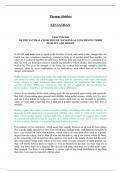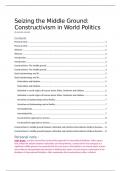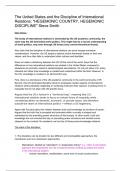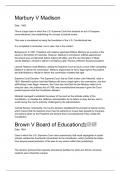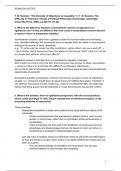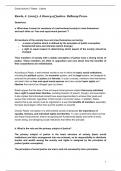Sciences Po • international relations
Derniers ajouts au international relations @ Sciences Po. Vous cherchez des notes international relations à Sciences Po ? Nous avons beaucoup de notes, de guides d'étude et de notes d'étude disponibles pour international relations à Sciences Po.
-
17
- 0
-
4
Cours international relations @ Sciences Po
Notes disponibles pour les cours suivants de international relations à Sciences Po
Dernier contenu Sciences Po • international relations
Cette fiche couvre la deuxième partie du cours "Espace mondial" dispensé à Sciences Po Paris en deuxième année. Elle couvre la période suivant le galop d'essai, c'est à dire l'équivalent de 6 cours. Elle comprend des dates, des définitions, des auteurs et des notions clés qui sont listées et expliquées.
Cette fiche de révision comprend toutes les notions et auteurs vus dans la période précédant le galop, soit la moitié du cours. Elle liste toutes les dates importantes, les définitions clés ainsi que les concepts et les auteurs à connaître.
In this document you'll find key dates regarding the history of colonialism and independence movements in Africa and the Americas, including key events such as treaties, abolitions, revolts, and international conferences. The document is divided into two parts: - Key dates - Short explanation for each event (3-4 sentences - sometimes more) Each date is categorized into 4 sub-parts: - Early European Colonization - French Colonization and Slavery - Other Colonial Powers and Intern...
In this document you'll find a paragraph by paragraph reading guide for Thomas Hobbes Leviathan CHAPTER XIII OF THE NATURAL CONDITION OF MANKIND AS CONCERNING THEIR FELICITY AND MISERY. Each paragraph is explained and simplified for you to better understand Hobbes' approach.
In this document you'll find a summary and explanation/simplification of the main ideas of Adler in Seizing the Middle Ground: Constructivism in World Politics. European Journal of International Relations. It includes : - A personal note with definitions/explanations of key terms - Introduction -Constructivism: The middle ground -Social epistemology and IR - Materialism and Idealism - Individual vs social origins of human action: Elster, Durkheim and Giddens - Verstehen as Epistemology...
In this document you'll find a summary and explanation/simplification of the main ideas of Steve Smith : TThe United States and the Discipline of International Relations: “Hegemonic Country, Hegemonic Discipline” 2003 4(2):67 - 85 - An explanation of the main thesis of the author - The state of the discipline - Still an American social science? - International relations and inequality - Conclusion
In this document you'll find a presentation of the political systems of both France and Italy. For each of them, I developped explanations on : - Their constitution - Legislative branch - Executive branch - Judiciary branch - Checks and balances
In this document, you will find summaries of important legal cases in the US : - Marbury V Madison - Brown V Board of Education - Loving V Virginia - Roe V Wade - Obergefell v Hodges For each of them, you'ill find : - The date - Why is the case meaningful for the US - The background/context - An explanation - The final decision of the court
This document is a reading guide for Scanlon "The Diversity of Objections to Inequality". You will find answers to 8 questions that will help you understand the main thesis and subtleties of Williams' approach. The questions are : a. What is the difference between a humanitarian concern as opposed to an egalitarian one? If they are different, then how could a humanitarian concern become a reason in favor of substantive equality? b. What is the problem, from an egalitarian perspective, with...
This document is a reading guide for John Rawls "A theory of Justice". You will find answers to 8 questions that will help you understand the main thesis and subtleties of Williams' approach. The questions are: a. What does it mean for members of a well-ordered society to view themselves and each other as “free and equal moral persons”? b. What is the role and the primary subject of justice? c. How does Rawls propose to make the original position “fair” among theindividual contr...




